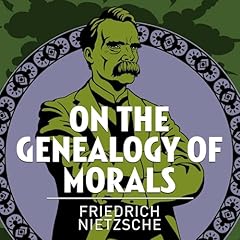
On the Genealogy of Morals
A Polemic
No se pudo agregar al carrito
Add to Cart failed.
Error al Agregar a Lista de Deseos.
Error al eliminar de la lista de deseos.
Error al añadir a tu biblioteca
Error al seguir el podcast
Error al dejar de seguir el podcast
 Exclusivo para miembros Prime: ¿Nuevo en Audible? Obtén 2 audiolibros gratis con tu prueba.
Exclusivo para miembros Prime: ¿Nuevo en Audible? Obtén 2 audiolibros gratis con tu prueba.Compra ahora por $15.32
-
Narrado por:
-
Duncan Steen
This is one of the most accessible of Nietzsche's works. It was published in 1887, a year after Beyond Good and Evil, and he intended it to be a continuation of the investigation into the theme of morality. In the first work, Nietzsche attacked the notion of morality as nothing more than institutionalized weakness, and he criticized past philosophers for their unquestioning acceptance of moral precepts. In On the Genealogy of Morals, subtitled "A Polemic", Nietzsche furthers his pursuit of a clarity that is less tainted by imposed prejudices. He looks at the way attitudes towards 'morality' evolved and the way congenital ideas of morality were heavily colored by the Judaic and Christian traditions.
Download the accompanying reference guide.Public Domain (P)2013 Naxos AudioBooksLos oyentes también disfrutaron:




















Las personas que vieron esto también vieron:


















Readers voice
Se ha producido un error. Vuelve a intentarlo dentro de unos minutos.
What stood out most was the genius of a man who called what society would look like 150 years before it occurred.
Se ha producido un error. Vuelve a intentarlo dentro de unos minutos.
Start Here!
Se ha producido un error. Vuelve a intentarlo dentro de unos minutos.
He established the spiritual, intellectual and physical norm for "weakness leaving the body."
If you look at his intensity as a war for the individual against false authority (master) and against false submissiveness (slave) you can then understand how his battle is to establish true value in life, as opposed to false submissiveness or brute authoritarianism. Enjoy.
Be strong, not weak.
Se ha producido un error. Vuelve a intentarlo dentro de unos minutos.
Mount Everest of philosophical works.
Se ha producido un error. Vuelve a intentarlo dentro de unos minutos.


